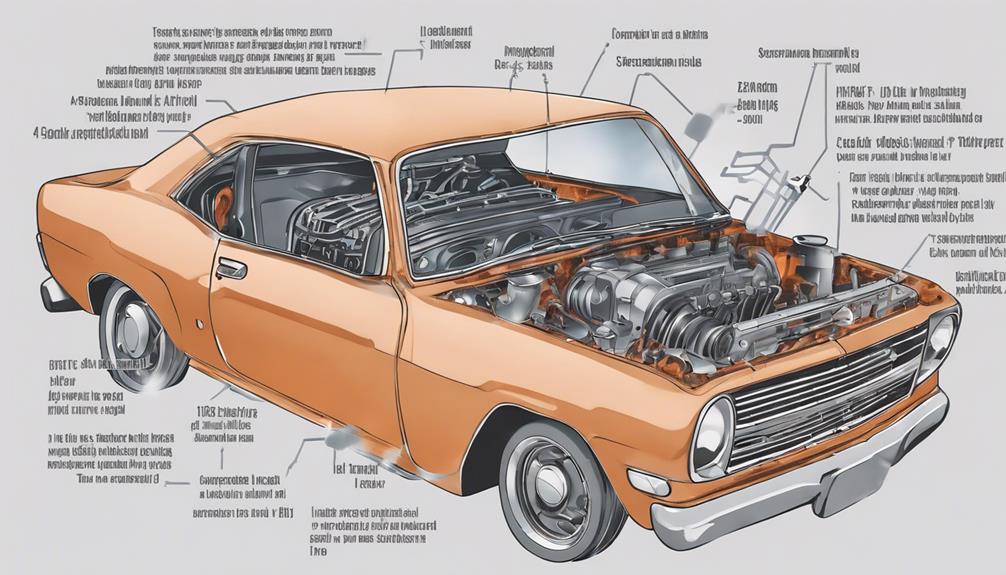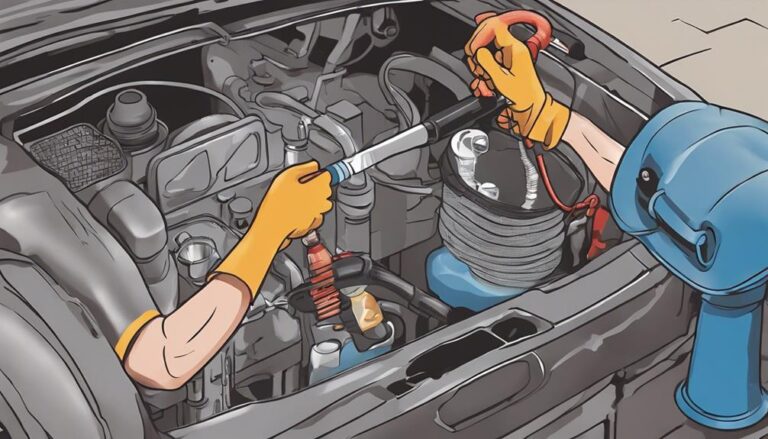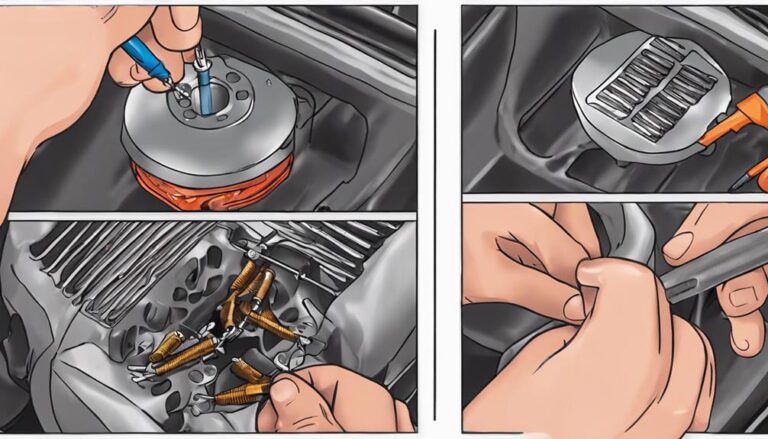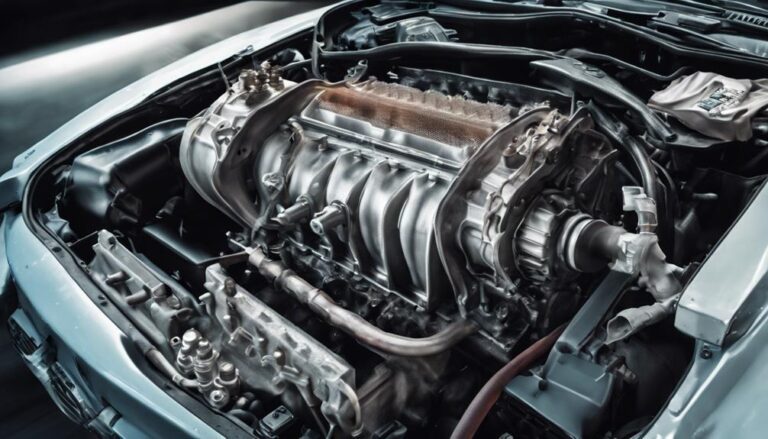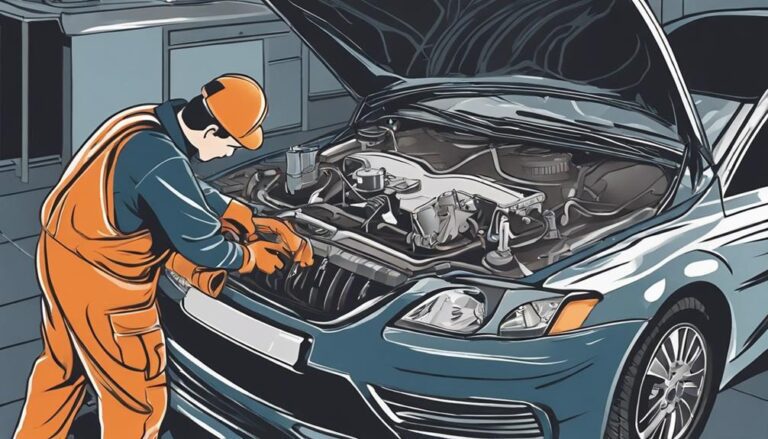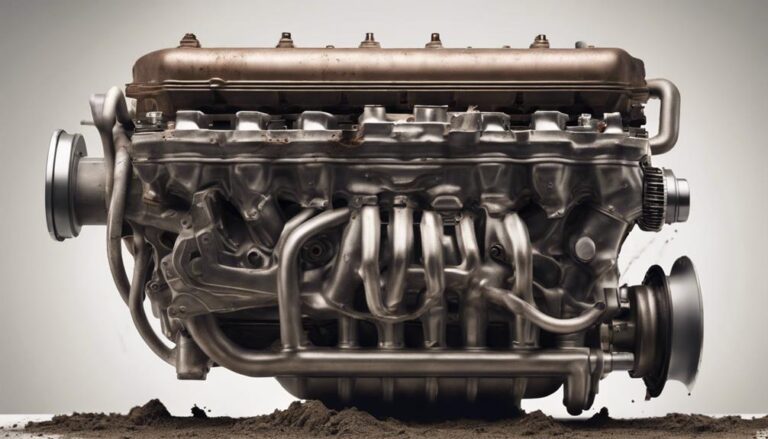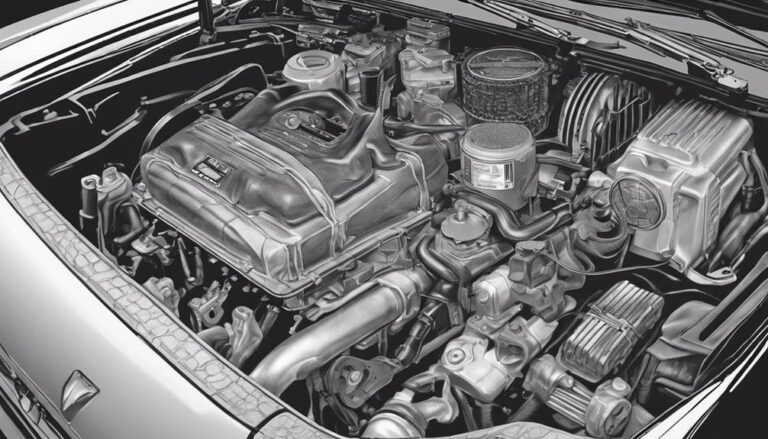7 Tips to Prevent Heater Core Corrosion in Cars
When it comes to keeping your car's heater core in top shape, it's important to prevent corrosion like a vigilant guardian shielding a precious treasure. Imagine the inconvenience of a malfunctioning heater on a frosty morning.
By following seven simple tips, you can safeguard your heater core from corrosion and guarantee a cozy cabin environment. Starting with an important coolant mixture, each step plays a critical role in maintaining your car's heating system.
Ready to equip yourself with the knowledge to protect your heater core?
Key Takeaways
- Regularly flush cooling system and maintain proper coolant mixture.
- Use corrosion inhibitors to extend heater core lifespan and improve heating performance.
- Park in sheltered areas to reduce moisture exposure and prevent corrosion.
- Promptly address signs of heater core corrosion to avoid damage and ensure safety.
Proper Coolant Mixture
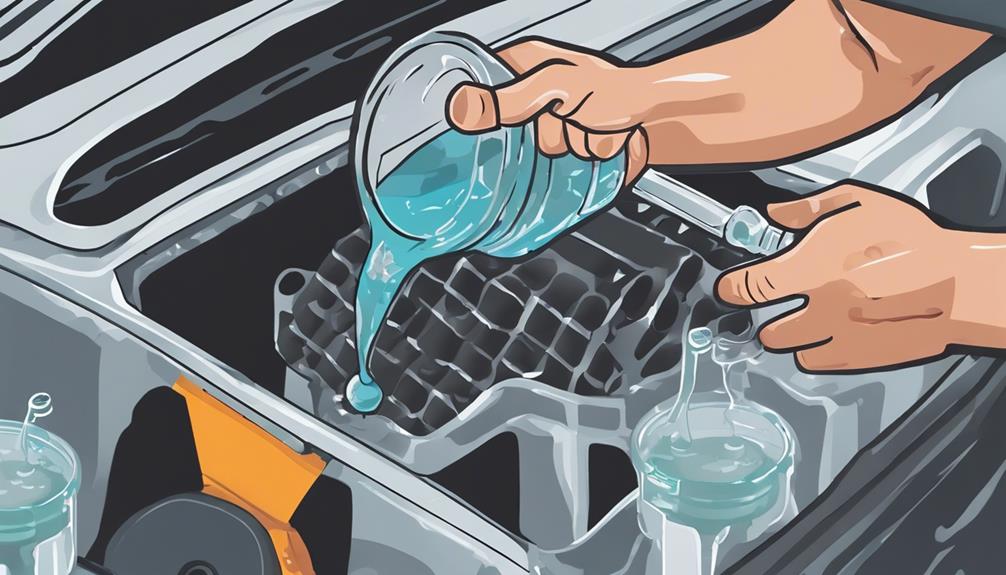
To prevent heater core corrosion in your car, make sure you use the correct coolant mixture recommended by the manufacturer. Coolant maintenance is important as it not only regulates the engine temperature but also plays a critical role in preventing corrosion within the heater core. The coolant in your car is a mixture of antifreeze and water. It's essential to maintain the proper balance of this mixture to guarantee peak performance and longevity of your vehicle's heating system.
Corrosion prevention starts with using the right coolant mixture. The manufacturer's recommended coolant type and ratio should be strictly followed. This ensures that the coolant effectively inhibits rust and corrosion within the heater core, prolonging its lifespan. Neglecting to use the correct coolant mixture can lead to accelerated corrosion, resulting in costly repairs or even the need for a complete heater core replacement.
Regularly checking and maintaining the coolant mixture in your car is an essential aspect of vehicle ownership. By following the manufacturer's guidelines for coolant maintenance, you can effectively prevent heater core corrosion and guarantee your car's heating system functions at its best.
Regular Flushing Schedule
Maintaining a regular flushing schedule for your car's cooling system is important for preventing heater core corrosion. Flushing involves draining the old coolant and replacing it with a fresh mixture, removing any built-up contaminants that could lead to corrosion. By adhering to a consistent flushing routine, you guarantee that the coolant flows smoothly through the heater core, preventing the accumulation of debris that may cause damage over time.
Regular flushing not only aids in corrosion prevention but also contributes to overall heater core maintenance. Over time, sediments and rust particles can accumulate in the cooling system, hindering its efficiency and potentially causing blockages in the heater core. Flushing helps to eliminate these impurities, maintaining the best functionality of the heater core and preventing costly repairs down the line.
To keep your car's heater core in top condition, follow the manufacturer's recommendations for flushing intervals based on your driving habits and environmental conditions. By integrating regular flushing into your maintenance routine, you can prolong the lifespan of your heater core and ensure a comfortable driving experience.
Use Corrosion Inhibitor
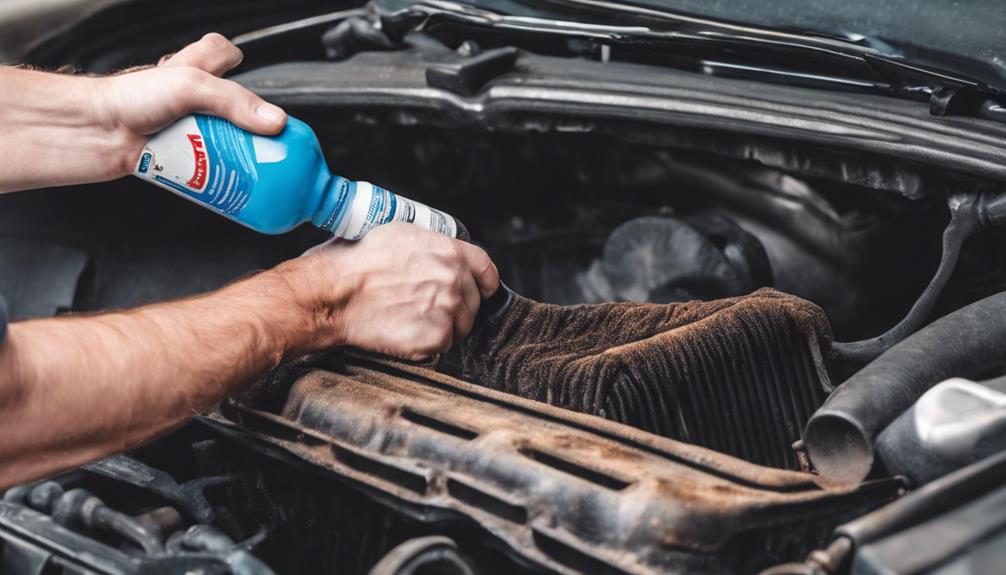
To protect your car's heater core from corrosion, it's important to understand the benefits of using a corrosion inhibitor. This product helps prevent rust and scale buildup, prolonging the lifespan of your cooling system.
Manufacturers often provide recommendations on how frequently to apply the inhibitor and make sure it's compatible with the type of coolant used in your vehicle.
Corrosion Inhibitor Benefits
Using a corrosion inhibitor provides essential protection against the deterioration of your car's heater core due to rust and corrosion. Corrosion inhibitors offer various benefits that are essential for maintaining the longevity of your vehicle's heating system:
- Corrosion Prevention: The inhibitor forms a protective barrier that prevents corrosive substances from attacking the heater core.
- Extended Longevity: By inhibiting rust and corrosion, the inhibitor helps prolong the lifespan of the heater core.
- Improved Performance: A corrosion-free heater core operates more efficiently, providing better heating performance in your car.
- Cost Savings: Preventing corrosion through the use of inhibitors can save you money on expensive repairs or replacements in the long run.
Application Frequency Recommendations
To guarantee maximum protection for your car's heater core against corrosion, determine the appropriate frequency for applying the corrosion inhibitor.
Proper corrosion prevention and heater core maintenance rely on a consistent application schedule. Typically, experts recommend applying the corrosion inhibitor every 30,000 miles or during your annual coolant flush. This frequency guarantees that the inhibitor continues to create a protective barrier within the heater core, preventing corrosion from developing.
Compatible With Coolant Types
For best protection against corrosion, make sure that the corrosion inhibitor you select is compatible with the type of coolant used in your car. Using the wrong corrosion inhibitor can lead to ineffective protection and potential damage to your heater core. To guarantee peak performance and longevity of your vehicle's heating system, consider the following:
- Check Coolant Specifications: Verify the type of coolant recommended for your car.
- Research Corrosion Inhibitors: Look for inhibitors specifically designed to work with your coolant type.
- Consult Manufacturer Guidelines: Follow any recommendations provided by your vehicle's manufacturer.
- Regular Maintenance: Maintain regular checks to ensure the inhibitor and coolant remain compatible.
Check for Leaks
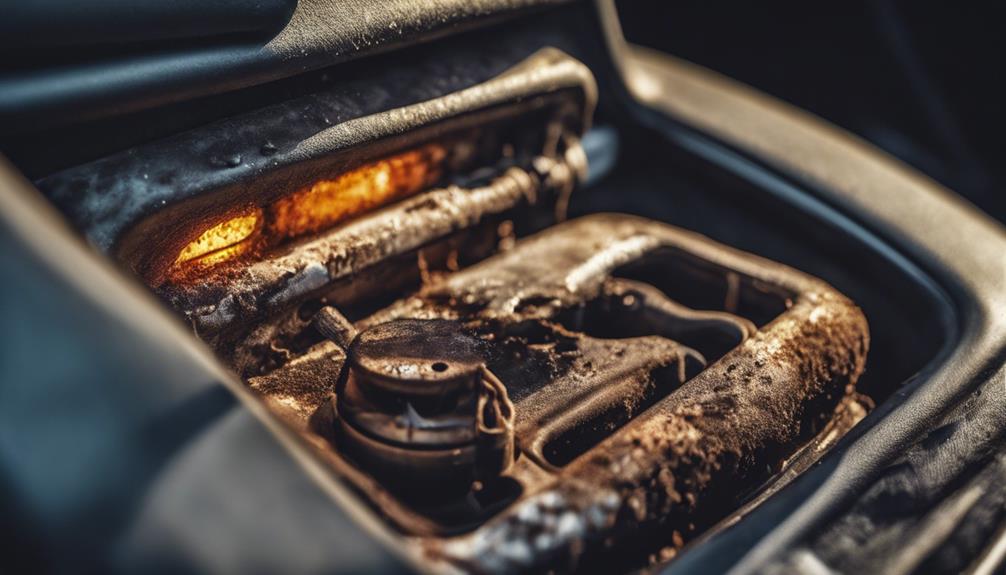
How can you effectively identify leaks in your car's heater core? One way to detect leaks is by checking for signs of coolant seepage on the floor of the passenger side of your vehicle. This could indicate a leak in the heater core. Another method is to inspect the windshield for fogging on the inside, which may suggest a coolant leak into the cabin. Additionally, keep an eye out for a sweet smell inside the car, as coolant has a distinct odor. Addressing leaks promptly is important to prevent further damage and corrosion in the heater core.
| Leak Detection Methods | Description |
|---|---|
| Coolant Seepage | Check for coolant puddles or wet spots on the passenger side floor. |
| Windshield Fogging | Look for fogging on the inside of the windshield, indicating coolant leakage. |
| Sweet Smell | Be aware of any sweet smell inside the car, which could signal a coolant leak. |
| Visible Corrosion | Inspect the heater core for visible signs of corrosion or rust. |
Maintain Cooling System Pressure
Checking for leaks in your car's heater core is essential; now, maintain cooling system pressure to prevent further issues. Proper maintenance of coolant pressure is critical for the health of your car's heating system. Here are four key steps to help you maintain ideal coolant pressure and prevent heater core corrosion:
- Regular Pressure Checks: Schedule periodic checks of your cooling system to guarantee the pressure is within the manufacturer's recommended range.
- Address Leaks Promptly: If you notice a drop in coolant pressure, investigate and repair any leaks immediately to prevent further damage.
- Use Recommended Coolant: Always use the coolant type specified by the manufacturer to maintain the proper pressure and prevent corrosion.
- Follow System Maintenance Schedule: Adhere to the maintenance schedule outlined in your car's manual to keep the cooling system in top condition.
Park in Sheltered Areas

When parking in sheltered areas, you benefit from covered parking which shields your car from environmental elements. This protection helps prevent heater core corrosion by reducing exposure to moisture and harsh weather conditions.
Covered Parking Benefits
To shield your vehicle's heater core from corrosion, you should consider parking in covered areas. Covered parking provides a protective shield against outdoor exposure, safeguarding your vehicle's components from the elements.
Here are four reasons why parking in covered areas can benefit your vehicle's heater core:
- Reduced Moisture Exposure: Covered parking decreases the amount of moisture that comes into contact with your vehicle, preventing rust and corrosion.
- Protection from UV Rays: UV rays can accelerate the deterioration of the heater core. Covered parking shields your vehicle from these harmful rays.
- Temperature Regulation: Covered areas help maintain a more stable temperature around your vehicle, reducing the risk of extreme heat or cold affecting the heater core.
- Decreased Debris Accumulation: Covered parking minimizes the accumulation of dirt, leaves, and other debris that can contribute to heater core corrosion.
Weather Protection Advantages
Consider parking in sheltered areas to shield your vehicle from harsh weather conditions and protect its components, including the heater core, from potential damage. To enhance this protection, investing in weatherproof covers and utilizing garage storage can provide additional layers of defense against the elements. Weatherproof covers act as barriers, shielding your car from rain, snow, and other environmental factors that can accelerate corrosion. Garage storage not only offers protection from weather but also shields your vehicle from temperature fluctuations, reducing the chances of heater core damage. By utilizing these weather protection advantages, you can greatly prolong the lifespan of your heater core and maintain the overall health of your vehicle.
| Weather Protection Advantages | |
|---|---|
| Benefits | Description |
| Weatherproof Covers | Acts as a barrier against rain, snow, and environmental factors. |
| Garage Storage | Provides protection from weather and temperature fluctuations. |
Shielding From Elements
Shield your vehicle from the elements by parking in sheltered areas to prevent heater core corrosion and maintain its longevity. When you expose your car to harsh weather conditions, you increase the risk of rust formation and damage to the heater core.
Here are four key reasons why parking in sheltered areas is important for rust prevention and weather resistance:
- Protection from Moisture: Sheltered areas shield your car from rain and snow, reducing the chances of water seeping into the heater core and causing corrosion.
- Limit Exposure to Salt: Salt used on roads in winter can accelerate rusting. Parking in a sheltered area helps minimize contact with salt-laden moisture.
- Reduced UV Exposure: Direct sunlight can deteriorate materials, affecting the heater core's weather resistance. Sheltered parking helps preserve the core's integrity.
- Prevention of Extreme Temperature Fluctuations: Extreme heat or cold can impact the heater core. Parking indoors or under cover helps maintain a more stable temperature environment, prolonging the core's lifespan.
Address Rust Issues Promptly
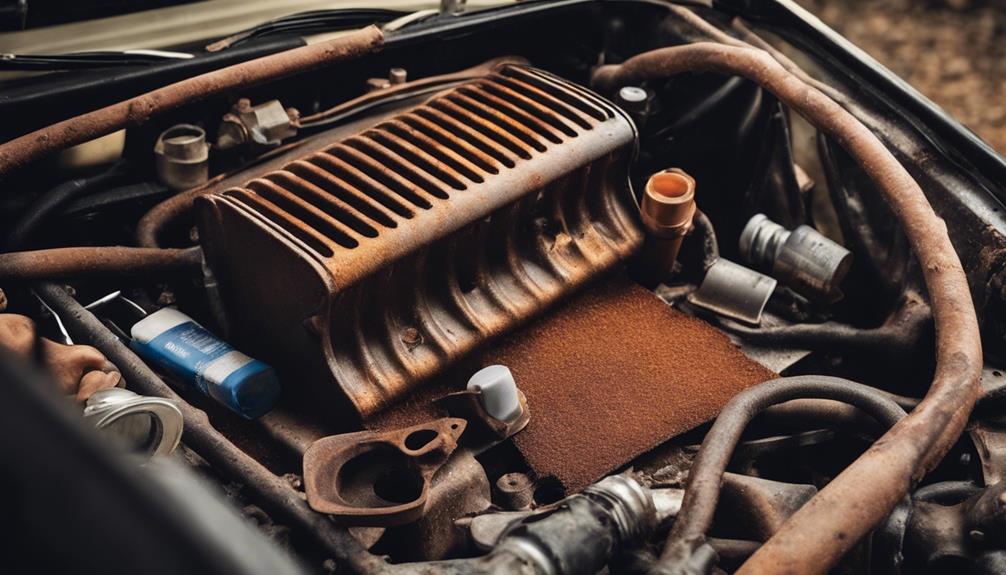
Addressing rust issues promptly is important in preventing heater core corrosion in cars. Rust is a common precursor to more severe corrosion problems in your vehicle's heating system. By promptly addressing any signs of rust, you can effectively mitigate the risk of heater core damage and guarantee your car's heating system functions at its best.
To help you understand the importance of addressing rust issues promptly, let's explore the potential consequences of neglecting rust in your vehicle:
| Consequence | Description |
|---|---|
| Heater Core Damage | Rust can lead to leaks in the heater core, causing a loss of coolant and reduced heating efficiency. |
| Reduced Lifespan | Neglecting rust can accelerate corrosion, leading to premature heater core failure and costly repairs. |
| Inefficient Heating | Rust buildup can obstruct coolant flow, reducing the heater's ability to warm the interior of your car effectively. |
| Safety Hazard | Severe rust can compromise the structural integrity of the heater core, posing a safety risk due to potential coolant leaks. |
Addressing rust promptly not only protects your heater core but also guarantees a safer and more efficient driving experience.
Frequently Asked Questions
Can Using a Specific Type of Coolant Prevent Heater Core Corrosion More Effectively?
Using a specific type of coolant can impact heater core corrosion prevention. Coolant additives differ in effectiveness comparison. Consider researching additives with anti-corrosion properties to protect your heater core more effectively and extend its lifespan.
Are There Any Signs or Symptoms of Heater Core Corrosion That Drivers Should Be Aware Of?
Keep an eye out for foggy windows, a sweet smell, or coolant leaks in your car. These could signal heater core corrosion. Regular maintenance checks and using the right coolant can help prevent this issue.
How Often Should a Professional Inspect the Heater Core for Corrosion?
To maintain peak performance, have a pro inspect your heater core annually for corrosion. Preventive measures like using coolant with corrosion inhibitors and flushing the system can help extend the core's lifespan.
Is There a Recommended Brand or Type of Corrosion Inhibitor to Use in the Cooling System?
When considering the best brands and recommended types of corrosion inhibitors for your vehicle's cooling system, it's important to prioritize effectiveness. Specific coolants like X brand's inhibitor have shown superior protection, ensuring best performance.
Are There Any DIY Methods for Preventing Heater Core Corrosion, in Addition to Regular Maintenance Tasks?
To prevent heater core corrosion effectively, DIY methods like flushing the cooling system with a vinegar solution can be beneficial. This preventive measure aids in removing buildup and prolonging the heater core's lifespan through simple maintenance tasks.
Conclusion
In conclusion, implementing these preventive measures can greatly reduce the risk of heater core corrosion in your car.
By ensuring a proper coolant mixture, regular flushing, and the use of corrosion inhibitors, you can maintain the integrity of your cooling system.
Remember to promptly address any leaks or rust issues that may arise.
By following these tips, you can prolong the lifespan of your heater core and avoid costly repairs in the future.

